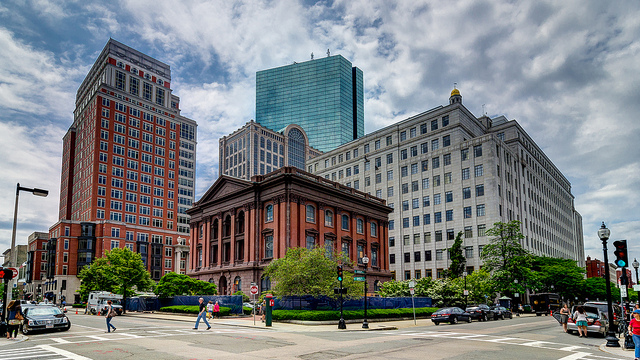In early July, I attended the 2016 CommonBound conference in Buffalo, New York representing the Institute for Policy Studies. CommonBound is coordinated by the New Economy Coalition (NEC), a network of organizations working to build an alternative economic system that is sustainable, democratic, and just.
Experiencing the conference with over 900 other registered attendees was challenging, exciting, and informative about the movement for “the new economy.” The new economy, I realized, does not only exist in hypotheticals or in dense theory. In fact, it’s already taking shape.
Speakers from the Boston Impact Initiative, for example, shared how they are attempting to create a resilient, healthy local economy in Eastern Massachusetts through strategically investing in nonprofit and for-profit organizations that otherwise struggle to find the funding and support they need to thrive and enrich the local community.
The new economy movement is an attempt to transform the “old economy,” which isn’t designed to provide all people with a fair standard of living. Instead, this kind of shareholder-driven capitalism is focused on turning the maximum amount of profit for bosses and owners for the least cost possible, regardless of the needs of workers who allow the system to function. That’s especially true for those marginalized on the basis of race, gender, ability, and the like.
The old economy, in short, emphasizes extraction — of labor from people, and natural resources from the Earth. New economists label this current economic and political system the extractive economy.
As an alternative to the extractive economy model, the new economy attempts to build a society based on an assumption that everyone deserves the resources needed to thrive, regardless of how much their labor is paid. As the New Economy Coalition puts it, “we must imagine and create a future where capital (wealth and the means of creating it) is a tool of the people, not the other way around.”
The new economy is a nebulous concept. It can mean innovative investment and loan practices that support local initiatives and organizations, like the Boston Impact Initiative, or working to redefine concepts like work and currency through the national development of time banks (including a few here in Washington, DC).
To bring together the diverse groups working on different parts of this expansive project, the New Economy Coalition is building a network of grassroots, “place-based” organizations that embody new economy ideals of justice, sustainability, and democracy. Already they’re coordinating endeavors to build businesses and affordable housing across the country. The Boston Impact Initiative, for instance, is a member organization of the Boston Ujima Project, which organizes around the Kwanzaa principle of “collective work and responsibility” to build a new, community-controlled economy in Boston.
One key tenet is the development of worker cooperatives. Worker cooperatives are small or medium-sized businesses that workers own and invest in directly, making decisions cooperatively and democratically. This allows community members to employ themselves. And because they have a direct stake in the business, both the business and the community are mutually interested in supporting one another.
This model of small, cooperatively-owned businesses bolstering local economies needs help. Most importantly, new economy organizers are looking for ways that all working people can enjoy ownership and autonomy in their workplace, instead of a few cooperatives in a handful of cities.
Organizations like the New York-based Working World is attempting to meet those needs. The Working World provides loans to cooperatively-owned businesses in the U.S. and Latin America to help them launch or grow their businesses. For example, Baltimore’s cooperatively owned bookstore and coffee shop, Red Emma’s, acquired a loan to purchase their in-house coffee roaster.
While small loans and business operations like Red Emma’s may seem inconsequential, they are making a big impact on the ability of worker-owned businesses to thrive and grow. Institutions like the Working World are proving that, if given the right resources and opportunities, alternative economic models for business and labor can work. The new economy is not only a good idea that can provide security and autonomy for low-income workers, but a complex and vibrant system that is already in the works.
